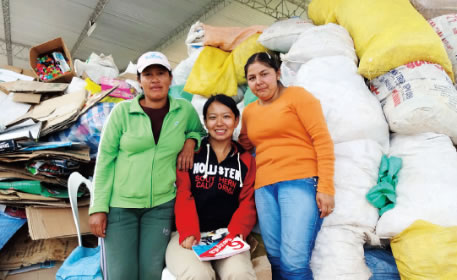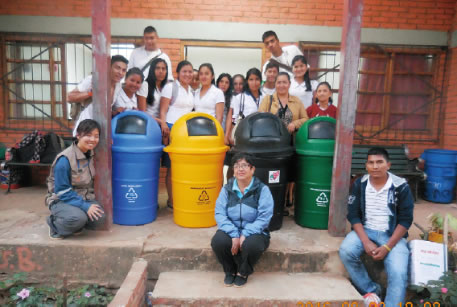Stories from the Field 07
Changing Mindsets to Stop Littering,
and Promote Sorting and Collecting Waste
– Japan Overseas Cooperation Volunteers engage in environmental
education in Bolivia

Ms. Tomoyo Hosokawa and her colleagues in front of the recyclable garbage in the recycling center (Photo: Tomoyo Hosokawa)
Bolivia, a South American country, is one of the countries which has strong links to Japan, as many Japanese emigrated there in the postwar years, and Japanese immigrants and people of Japanese descent are playing active roles in various sectors of society. Bolivia also has a growing economic relationship with Japan due to its rich natural resources, including zinc, lead and lithium. However, Bolivia also faces many challenges to cope with, since its income level is the lowest in South America, and more than 60% of the population live in poverty.
One of these challenges is the environmental issue. The public services, such as waste sorting, collection and disposal, are not sufficient in Bolivia. The foul smells and pest infestations around garbage dumps in urban areas cause the hygiene situation to deteriorate and also generate concerns over pollution of the environment including water and soil, as well as adverse impacts on people’s health. To solve these issues, Japan has provided assistance for waste disposal and recycling, and currently dispatched two members of the Japan Overseas Cooperation Volunteers (JOCV) to Bolivia.
“I have already been here for one year, and I feel that people are finally starting to understand the necessity of sorting waste.”
These are the words of Ms. Tomoyo Hosokawa, who was dispatched to Bolivia in June 2015. She joined the JOCV after graduating from a university and was sent to the Vallegrande City Office in Santa Cruz Department.

Ms. Kaori Kii and school staff together with colorful trash cans donated to the school (Photo: Kaori Kii)
Various projects are being implemented in Vallegrande City, including the “Solid Waste Recycling Project in Vallegrande City” under the JICA Partnership Program (JPP) and the “Waste Disposal Facility and Waste Collection Trucks Development Plan” under the Grant Assistance for Grass-Roots Human Security Project. Although the administration has a higher awareness of environmental issues than in other regions, the awareness of local residents remains low.
In this situation, Ms. Hosokawa has engaged in environmental education to promote waste sorting. Past environmental education was implemented by city officials visiting schools and explaining orally to children about the importance of waste sorting. However, Ms. Hosokawa felt that these explanations were abstract and were not well understood by the children. What is more, she got the impression that the school teachers did not consider environmental education as their job, but rather as the work of city officials. Ms. Hosokawa therefore decided to embark on environmental education not for the children, but for the teachers instead. She created learning materials by hand, including picture-story show cards, which could be used by the teachers when providing education to children, and sought to deepen understanding among teachers about such teaching methods through repeated visits to schools. In addition, she also set up trash cans for waste sorting in every school in the City.
Ms. Hosokawa says, “Every time I met and spoke with colleagues and teachers, I tried to be clear on the purpose of the action and what it was that I was trying to convey. Recently in our discussions, my colleagues and teachers gained a sense of purpose and said things like ‘Let’s do this,’ which I feel is a small but nonetheless significant outcome of my activities.”
Another person is Ms. Kaori Kii, a public official from Iizuka City in Fukuoka Prefecture. Using the system of leave for public officials for the purposes of self-development run by Iizuka City, she applied to join the JOCVs and since July 2014 she has been engaging in environmental education in Pampa Grande City in Santa Cruz Department. Similarly, local residents in Pampa Grande have a low level of environment awareness. Waste is not sorted, and there is continuous dumping of waste on roads and in rivers. As this waste includes used containers of agricultural chemicals, there are also concerns over the contamination of agricultural water.
As a means of encouraging residents to change their mindsets, Ms. Kii started sorting and collecting recyclable waste at schools. Once a month she holds a workshop on waste sorting and collection for teachers, and creates mechanisms for the teachers to provide instruction for students on sorting and collection. Through her classes she conveys the importance of sorting waste and why littering is a bad thing. Ms. Kii says that providing this information for children can be expected to spread the interest in waste-related issues to their families, relatives, friends, and the wider community.
In order to improve the collection rate of agricultural chemical containers, Ms. Kii also holds courses for the producers on the correct methods of the use of agricultural chemicals and how to dispose of containers. Moreover, as television commercials for the local community can be made and broadcast cheaply, she is also concentrating on efforts to raise awareness through television and radio, including the creation of a TV advertisement which appeals to littering prevention and promoting the collection of agricultural chemical containers.
Ms. Kii says, “When I provide environmental education at first hand to the children, I always tell them ‘Let’s stop littering. If your parents do it, you must warn them not to.’ One of my acquaintances told me that he was scolded by his own son for littering, which gave me a real sense that people’s mindsets are changing gradually.”
As a result of the activities of these two JOCVs engaged in environmental education, the mindset of local people seems to be gradually changing. It is hoped that these small steps forward will contribute to the realization of a sustainable society through measures to protect the environment.
<< Previous Page Next Page >>
Main Text | Statistics and Reference Materials | Stories from the Field | Master Techniques from Japan to the World | ODA Topics
